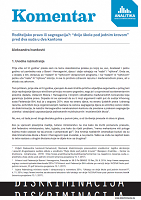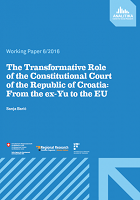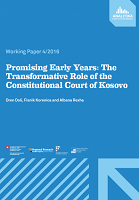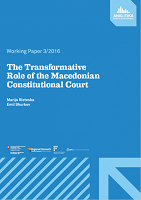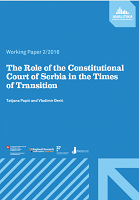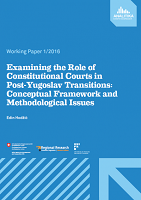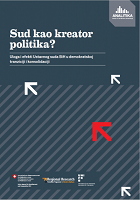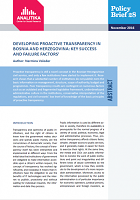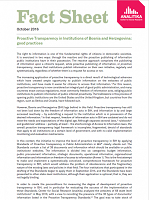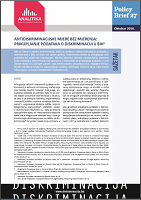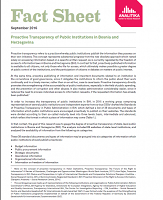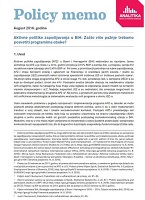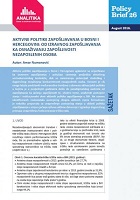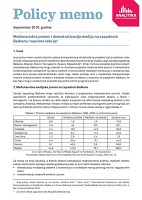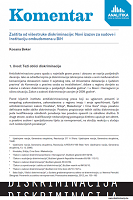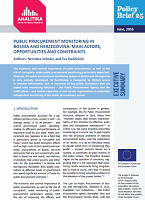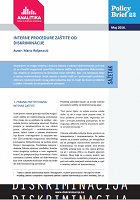Court as a Policy-Maker?: The Role and Effects of the Constitutional Court of Bosnia and Herzegovina in Democratic Transition and Consolidation
Author(s): Nedim Kulenović / Language(s): English
Keywords: Courts; policy making; effects; BiH; Constitutional Court; transition;
That Bosnia and Herzegovina (‘BiH’) is still, twenty years after the end of the war, a country in transition – not only towards a stable post-conflict society, but also from a ‘moderate authoritarian socialism’ towards a democratic form of government with a different economic system – is a living reality. In the words of the Constitutional Court of Bosnia and Herzegovina (‘BCC’ or ‘the Court’) itself, the fact of transition is ‘indisputable’. Moreover, because of that, the country ‘has a dominant tendency to become a part of the general stream of internationalization (primarily to join the European Union), which implies a high level of democracy within all segments of society.’ In fact, the parlance of BCC is a witness to an even more specific meaning of transition, one that denotes a sufficient passage of time which would warrant the movement away from the discriminatory power-sharing mechanisms initially justified by the circumstances of necessity, towards a ‘pluralisation of ethnocracy’, or even its transcendence. What is the proper role of the Court in this process of transition? Writing already in 1996, on the dawn of the new era of the Court, the first president of the post-Dayton BCC expressed this general dilemma by indicating that the Court is expected to contribute ‘to the protection and further development of democratic socio-political and legal unity in the country’, but without ever itself becoming a ‘writer of constitution and statutes.’ This general concern expressed in the early years of the Court was not followed by a genuine debate on the proper role of BCC in the Bosnian constitutional system, which was odd considering the problematic nature of the Constitution that resulted from the General Framework Agreement for Peace in Bosnia and Herzegovina (‘Dayton Agreement’). Indeed, the Constitution established a deeply decentralized and unstable state, described by one of the former judges of the Court as ‘the weakest federal system in the world’, and by another as an outright confederation. It also institutionalized what Yee called ‘ethnic sovereignty’, a number of powersharing mechanisms that, because of their often discriminatory nature, stand in apparent conflict with the wide-ranging entrenched human rights protections. Having such a Constitution in focus, which framed a system of government for a truly unstable and ‘fragile democracy’, BCC was faced with a formidable challenge: on the one hand, it was expressly tasked with the ‘upholding’ of such Constitution (Article VI/3), and on the other, there seems to have been an implicit understanding – in view of its composition, competences, and positioning – that the Court was to provide ‘some remedy for the potential ills in the governmental structure’ created by the Constitution itself. The largely unexamined role of BCC in such processes of transformation is made more interesting by a peculiar fact of the Constitution of BiH: despite all of its shortcomings, it proved to be tenacious. Even though it has been noted that the establishment of ‘an enduring constitutional scheme appears to be quite difficult, particularly in new democracies outside of Western Europe and North America’, BiH features one of the oldest constitutions in the region which, in twenty years of its existence, has seen only one formal amendment, of slight importance. Despite the fact that the country still features a deeply divided society and an unstable political system, in those two decades its constitutional system has changed to a significant degree. Although BCC still refuses to define the form of the governmental structure, maintaining that the ‘complexity of the constitutional order of BiH indicates a sui generis system’, the number of the transferred and assumed competences at the state level, along with the accompanying establishment of numerous new institutions, suggests that BiH is now a more robust asymmetrical federation.16 The political regime of consociational democracy, particularly at the lower levels of government, has – to use the terminology of a leading scholar of the Bosnian Constitution – also gone through a significant transformation from an ‘exclusive’ to a ‘participatory ethnocracy.’ In what follows, we will argue that BCC has had an important part to play in this informal constitutional transformation, mainly through its powers of abstract review, on both axes: in relation to state structure and to the political regime in the country. Such focus will also facilitate the examination of the Court as a political institution and a policymaker. In the examination of the contribution of BCC to this process of democratic transition, consolidation and social transformation in BiH, we will employ a multilevel case study approach, where on one hand we will examine the Court as an institution, while on the other we will focus on its specific decisions. Having that in mind, in the first part of the article, we will explore the competence, composition and positioning of BCC and will try to ascertain how such institutional features of the Court have influenced its overall performance. In the second part, we will particularly focus on the question to what degree can it be said that the Court was activist, also trying to characterize the nature of such activism and the understanding of the very notion in the Bosnian context. That will be done, not only by broad overview of BCC jurisprudence in focus areas, but also, in the third part, by more detailed analysis of its landmark decisions. Finally, we will focus on the effects of that activism and its consequences for the Court’s legitimacy.
More...



